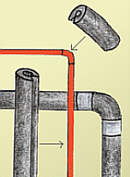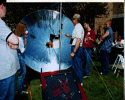- Lower water temperature. Domestic hot water should generally be provided at about 120 degrees F. If water in dwelling units is hotter than 120 degrees, the water temperature can be lowered to save energy. Individual hot water heaters should be set at 120 degrees, while in central systems, the temperature should be adjusted so that 120-degree water is provided to the dwelling units.
- Repair all leaks. Maintenance staff should periodically inspect all apartments and repair leaky faucets. One leaking faucet can waste more than 1,000 gallons per year as well as 500,000 Btus necessary to heat it. In addition, staff should inspect the entire distribution system, valves, and pumps.

- Insulate domestic hot water pipes. All domestic hot water circulation pipes should be insulated with one-half inch of insulation to reduce heat loss. Older domestic hot water heater tanks also should be insulated.
- Turn off domestic hot water supply to areas that do not need it. Hot water supplies to areas such as utility rooms, boiler rooms, and other rooms should be turned off. Shut off should occur as near to the hot water heater as possible to reduce piping energy losses.
- Reduce water pressure. In buildings where the water pressure is higher than necessary, a pressure regulator should be installed to reduce pressure to the minimum level required by local code. High water pressure results in high flow rates and water waste. It also can increase wear and tear on plumbing equipment and result in leaks.

- Flush tank-type water heaters. Tank-type water heaters (both gas and electric) should be flushed periodically to remove sediment. The accumulation of sediment on the bottom of the tank results in inefficient operation of the water heater. The water should be drained into a bucket until it runs clear.
- Clean/adjust burners on gas and oil water heaters. Burners on gas- and oil-fired domestic hot water heaters should be cleaned and adjusted annually for combustion efficiency. The buildup of soot or other residue decreases combustion efficiency. If necessary, qualified stadd should adjust the flame in accordance with the manufacturer's manual.
- Check electrodes on electric water heaters. Electrodes on electric water heaters should be checked for scale buildup. Removing scale buildup will increase heat transfer.
For more ways to reduce energy costs, see PHECC's Energy Conservation Measures.
|
TURN OFF UTILITIES: Turn off electricity, gas, propane, and other utilities before starting repairs, cleaning, or installations to avoid accident or injury. BE AWARE OF LEAD-BASED PAINT HAZARDS: Many residences built before 1978 have paint that contains lead, which can pose a serious health hazard if paint, chips, and dust are not handled properly. See the U.S. Environmental Protection Agency (EPA) lead brief before disturbing painted surfaces in homes of this vintage. Follow the HUD "Lead-Safe Housing Rule" for requirements for notification, evaluation and reduction of lead-based paint hazards. BE AWARE OF ASBESTOS HAZARDS: Homes older than 1977 may have building products that contain asbestos such as insulation, high-temperature gaskets, roofing and siding shingles, and vinyl sheet flooring. See the EPA asbestos brief before disturbing such materials. BE AWARE OF MOLD AND MOISTURE HAZARDS: Molds can gradually destroy materials they grow on; can irritate the eyes, skin, nose, throat, and lungs of both mold-allergic and non-allergic people; can cause asthma attacks in people with asthma who are allergic to mold; and can cause other serious health problems. To learn more about preventing and cleaning up mold in homes, see these mold guides and the EPA brief on What to Wear When Cleaning Moldy Areas. |
- Log in to post comments